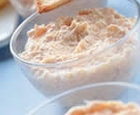|
British Tea Time Salmon-Caper Sandwiches This creamy salmon spread gets a little kick from capers and lemon zest. 1/2 C salmon, fresh or canned In a food processor, blend first 4 ingredients to a smooth, grainy paste. Stir in (don't use the processor for this step) parsley, lemon zest, and capers. Spread mixture on 6 slices of bread, add a slice of lettuce to each, and top with remaining 6 slices. Carefully, trim the crusts (save for making breadcrumbs). Then slice the sandwiches diagonally for 12 pieces; slice again for 24 smaller triangles. |
Tips & Glossary Clotted Cream: a thick yellowish cream made from unpasturized cow's milk. You can make your own, although it's hard to find unpasturized cream in the U.S. Still, you'll find 3 recipes under Scones. All use pasturized cream; try to avoid "ultra" pasturized. Ploughman's Lunch: sounds romantic, like a peasant dish from medieval times, but it's a marketing gimmick from the 1970's! It's become a popular lunch in Britain now: a piece of bread, hunk of cheese, with onion, gherkin, and an apple. Our Ploughman's Soup is a take-off on that name. Roux: (“roo”), paste-like mixture of melted butter and flour, into which liquid is gradually added. Used as a thickening agent for soups and all classic French sauces. Basic Roux: melt 1 part butter and add 1 part flour. Stir continuously till it becomes paste-like. Slowly add whatever liquid your recipe calls for. Tea Time: Afternoon tea became fashionable in the mid-1600's. A light snack with sandwiches and sweets, it's served from 3-5 in a sitting room. High tea, is a light meal served from 5-6 in a dining room. ("High" because the dining table is higher than the low ones in a sitting room.) Yorkshire Pudding: from the northern county of Yorkshire, originating in the early 1700s when flour was more readily available. A pancake like batter is spooned into the drippings of a roast as it cooks. Eaten alongside the roast or as a separate course.
|

